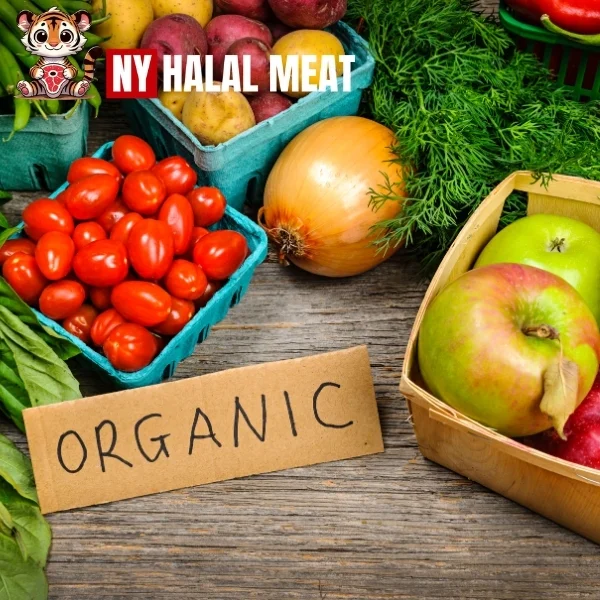Is Organic Always Halal? Clarifying Misconceptions
What Does Organic Mean?
Organic food refers to food that is grown and processed following strict guidelines that prioritize sustainability, environmental health, and the use of natural substances. Organic farming practices avoid synthetic pesticides, fertilizers, and genetically modified organisms (GMOs). Organic certification is granted by authorized bodies in many countries, ensuring that food products meet specific organic standards.
However, it’s important to note that organic certification primarily focuses on how food is produced — emphasizing environmentally friendly farming practices such as crop rotation and composting — rather than the specific sourcing or processing of ingredients. While organic farming promotes health and sustainability, it does not necessarily ensure that the food adheres to halal dietary laws.
What Does Halal Mean?
Halal, an Arabic term meaning “permissible” in Islam, refers to food that complies with Islamic dietary laws, which are detailed in the Qur’an and hadith. These laws prohibit the consumption of specific foods, including:
- Pork and pork products
- Alcohol and intoxicants
- Meat from animals that have not been slaughtered according to halal guidelines
For meat to be considered halal, it must come from an animal that has been slaughtered in accordance with Islamic procedures, known as “zabiha.” This process includes the recitation of the name of Allah, and the animal must be treated humanely and slaughtered in a specific way.
Organic Does Not Always Mean Halal
While organic food is often seen as healthier and more ethically produced, it doesn’t automatically meet halal standards. Here’s why:
- Non-Halal Ingredients: Even organic foods can contain ingredients that are not halal. For example, some organic products might include alcohol-based flavorings, gelatin derived from non-halal animals, or other animal-derived ingredients that do not comply with halal laws. These ingredients are often used as food additives or preservatives, and they may appear in otherwise organic products.
- Slaughtering Practices: Organic meat may not be slaughtered according to halal standards. Organic certification focuses on farming practices, but it does not regulate how animals are slaughtered. If the slaughtering process does not meet the specific halal guidelines, the meat cannot be considered halal, even if it is organic.
- Separate Certifications: Organic certification and halal certification are two distinct processes. Organic certification ensures the food is produced using organic farming methods, while halal certification ensures the food complies with Islamic dietary laws. It’s important to recognize that just because a product is organic doesn’t mean it has been halal-certified.
How to Ensure Organic Food is Halal
For those who wish to consume food that is both organic and halal, there are ways to ensure you are making the right choice:
- Look for Dual Certification: The best way to ensure that a product is both organic and halal is to look for both certifications on the packaging. Some brands offer products that are certified organic and halal, providing transparency for consumers who seek both qualities.
- Check Ingredients Carefully: Always read the ingredients list on organic products. Some organic foods may contain non-halal ingredients, such as alcohol, non-halal gelatin, or animal-derived additives. If you follow a halal diet, make sure to check labels to ensure all ingredients are compliant with halal standards.
- Contact the Brand or Manufacturer: If you’re unsure whether an organic product meets halal standards, consider reaching out to the brand or manufacturer for clarification. Many companies are transparent about their sourcing, production methods, and certifications. If the information is not clear on the packaging, contacting the company directly is a reliable way to confirm whether a product is both organic and halal.
Conclusion

In conclusion, while organic food offers several health and environmental benefits, it is not always halal. Organic certification guarantees that food is produced without synthetic chemicals and using sustainable farming practices, but it does not ensure that the food complies with Islamic dietary laws. For meat to be halal, it must be slaughtered according to specific guidelines, and the ingredients must be free from prohibited substances. Therefore, if you are looking for food that is both organic and halal, be sure to look for products that are certified with both organic and halal labels. By understanding the distinction between organic and halal certifications and checking ingredients carefully, you can make informed choices that align with both your health and religious values.


